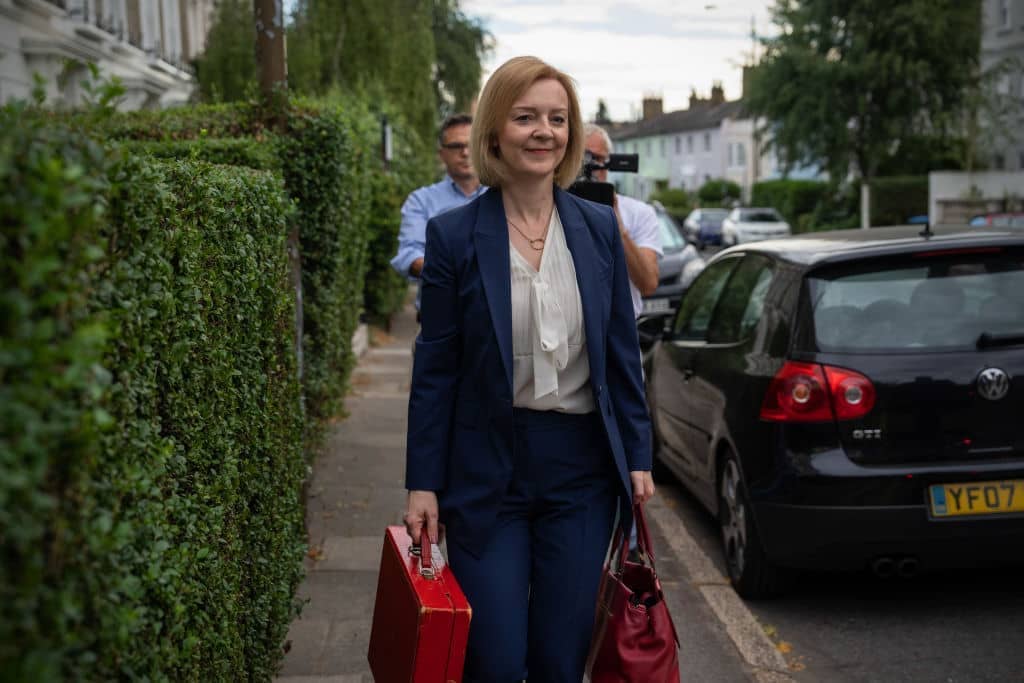Launching her campaign for party leader and prime minister, Liz Truss said something that barely registered amid the big tax-cutting promises, but made me prick up my ears in a very positive way. She talked about trying to make sure that parents and other carers were not penalised by taking time out of paid work.
‘To ensure people aren’t penalised for taking time out to care for their children or elderly relatives,’ she said, ‘we will review the taxation of families’, describing families as ‘a vital part of our lives and the crucial building block for a stable society’.
Now many will see this as a typical sop to those nostalgic for a time when marriage was the norm, most babies were born (as used to be said) in wedlock, and women gave up paid work to stay at home with their children, at least until they started school. And maybe Truss’s pledge was tailored to exactly that constituency.
But it might be worth hoping that her interest in reviewing family taxation goes beyond garnering leadership votes and towards addressing a big injustice in the current tax system, which also has knock-on effects on the number of people willing and able to work. For while the penalties Truss mentioned are very real, they are even more real in the UK than in most other countries of the OECD because of an incomplete reform of our tax system.
People in the UK are taxed on their income as individuals. There are a few tweaks, but this is the general rule. In almost every other industrialised country in the world, it is the household that is the unit for assessment of tax. In some countries there is a choice, so couples can opt to be taxed individually or together. But for the best part of 30 years, the UK has treated the individual as the unit of tax, and barely nods to the family at all.
I discovered the cost of this when I returned to the UK in the early 2000s after a decade working abroad. Over those years my husband’s Parkinson’s had worsened to the point where he could take only a little, if any, paid work. In practically every country in the world, including the US where we then were, we would have been taxed as a unit. That is, two individuals in the same household, married to each other, pooled their income and their allowances. So a one-earner couple – as we were – would pay a lot less tax than if that one earner were taxed as a single person.
Returning to the UK, my income put me into a higher tax bracket – not by much! – but couples, married or not, are treated for tax purposes as two individuals, no ifs, no buts. My husband was unable to work; he had no income to set against his tax allowance, but tough – there’s the Great British benefits system for that. Except even that is more complicated.
As with adult social care, some of the major disability benefits in the UK are means-tested. And if you are in the same household, guess what? That means-testing applies to the household, and one earner’s income may well disqualify that household from all means-tested benefits.
A couple of years ago, I chanced upon a night-time phone-in discussing precisely this Catch-22, with partners of disabled people in tears at the choice they faced: carry on working, perhaps with reduced hours, and pay for your partner’s needs, or give up work and rely on the state – once, that is, any savings have been run down to the decreed minimum.
The tax regime as it stands seems particularly harsh on couples where one cannot work because of a disability. But the same principle applies to a family where one parent stays at home to look after children or an older relative. The one earner is taxed as an individual. Unless the couple is financially savvy and has investments or savings that can be transferred to the non-earner, the non-earner’s tax-free allowances go to waste.
At this point you might object that it is a conscious choice of a parent to stay at home to look after the children – whether on principle or because of the cost of childcare. But that is not how these things work in other countries. Those governments – most governments – have recognised the family as people who share their assets for mutual benefit.
This may be part of the explanation for the consistently high rates of child poverty in the UK by most international comparisons. But also for the rates
of poverty in two-parent families with a single earner, and particularly in those where one partner has a disability. A recent report
finds that single-earner couples in the UK face a tax burden of 18 per cent on earnings, above the developed world average of 13 per cent.
A few tweaks have been made, including tax credits for children against earned income and the 2015 marriage allowance, which permits one spouse to transfer a mere 10 per cent of his or her tax free allowance to the other. But it would be far simpler (and more effective) to make all allowances transferable between couples – which was the original intention when Nigel Lawson as Chancellor introduced individual taxation back in 1990. That crucial sequel, however, never happened.
So why is the UK such an outlier in family taxation, and why has nothing been done to complete the reform, or to give people the choice of being taxed by household? Individual taxation was introduced partly because the way the system worked left some couples better off staying single than marrying (the so-called ‘marriage penalty’).
But it was introduced largely in response to objections from women that, for tax purposes, the man was regarded as the head of household and responsible for tax returns and they had no financial privacy. Any reversion to household taxation thus risks being seen as a retrograde step for gender equality unless it offers, at the very least, a choice between individual and household taxation.
At the same time, however, it needs to be recognised that it is women by and large as carers who have been penalised by the effects of individual taxation. If Liz Truss wants to review the taxation of families, I wish her God speed – and the courage to challenge those campaigners who have left some women poorer, even as they believed they were standing up for their rights.
Mary Dejevsky
Liz Truss is right to look at family taxation






Comments